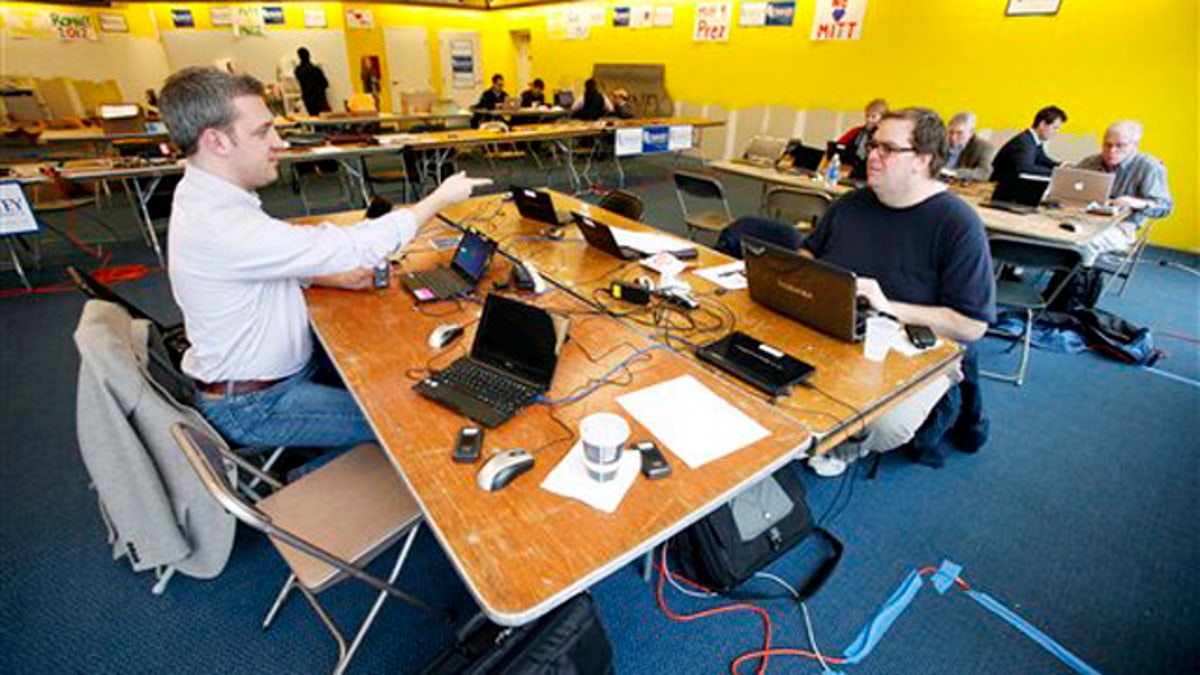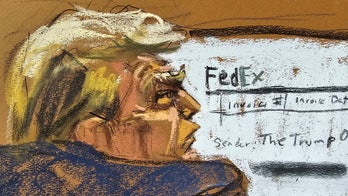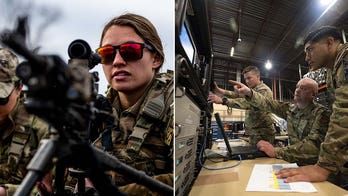
Dec. 30, 2011: Volunteers work at Mitt Romney's campaign headquarters in Des Moines, Iowa. (AP)
The Republican presidential candidates are supercharging their ground games, as the mish-mash of polls fades away to leave candidates relying on the crucial Iowa caucuses to judge who's up and who's down.
One day out, Iowa's Republican powerbrokers say the race remains "wide open." The only candidates significantly trailing in the polls are Jon Huntsman, who long ago conceded Iowa, and Michele Bachmann. The rest of the field is in flux, with Rick Santorum creeping into the top tier alongside Mitt Romney and Ron Paul.
But the polls are fantasy if candidates can't bring out supporters on caucus day, when they'll need surrogates in place to make their cases at caucus sites. By nature, caucuses require a bigger time and energy commitment from voters than traditional primaries, which involve a simple vote as opposed to a drawn-out process of campaign pitches and ballot-casting. The winning candidate will need his or her supporters to make that commitment.
"It all depends on who turns out," Iowa Gov. Terry Branstad said on "Fox News Sunday."
A large chunk of the election could be decided at the caucus site, with so many likely caucus-goers indicating they might switch their minds by Tuesday. The Des Moines Register poll, reflecting prior surveys, showed over the weekend that a stunning 41 percent of expected caucus-goers were either undecided or open to choosing a different candidate on caucus day.
Matt Strawn, chairman of the Iowa Republican Party, said on NBC's "Meet the Press" that campaigns will want to have somebody in every precinct to represent them.
"You always hear the mantra -- organization, organization, organization," Strawn said, stressing the volatility in the race.
Rick Perry, among others, is heeding that message. His struggling campaign has brought in a so-called "Iowa strike force" of hundreds of volunteers from his home state of Texas. They're working with the campaign, calling likely caucus goers and going door to door to help boost support. Some will act as surrogates at caucus sites.
Newt Gingrich, too, has brought in supporters from other states. Both candidates appear to have settled into the middle tier, with the Des Moines Register poll pegging Gingrich at 12 percent and Perry at 11 percent.
Perry claimed on "Fox News Sunday" that the momentum is heading in his direction.
"They're very interested in having an experienced executive in the White House," the Texas governor said, citing as well his "social conservative message."
But it is Santorum who is making a big play for the social conservative vote, one that is key to victory in the Hawkeye State.
Santorum, who just two weeks ago was polling in single digits, came up third in the Des Moines Register poll. For the final two days of polling, he placed second behind Romney.
Santorum said on "Meet the Press" that the late Iowa surge is "exactly" what he'd been predicting about his Iowa-focused campaign. "We feel very good about the way things are going on the ground," he said.
With the rising status comes criticism from his opponents. On "Fox News Sunday," both Bachmann and Perry went after Santorum for pursuing earmarks while in Congress. Bachmann also cited Santorum's decisive defeat to Democratic Sen. Bob Casey in his 2006 re-election race.
"Senator Santorum has stood for earmarks, has stood for spending. That's not what we want," she said.
Santorum said he pursued earmarks because the role of members of Congress is to have a say in how federal dollars are spent. Santorum said he stopped supporting the practice after "abuse of this process" led to greater levels of spending.
Bachmann's poor standing in the polls is unusual considering she won the state's Ames Straw Poll over the summer. She has not been able to recover support since falling behind in October. Still, she said Sunday that her events are attracting "huge crowds" where there are "thousands of people making conversions on the spot."
Romney, the former Massachusetts governor, continues to lead by a thin margin in most recent polls, while Paul competes with Santorum for second position.
On "Fox News Sunday," Paul rejected the suggestion that his supporters are peeling away.
"I think our numbers will continue to grow, even in these last couple days," Paul said.
Gingrich stressed that he remains competitive in Iowa, though he cast his sights on subsequent primary contests.
"You'll see the race stabilize over the next month," Gingrich told Fox News.
While noting Romney's advantage in the first-in-the-nation New Hampshire primary, the former House speaker predicted the "Massachusetts moderate" would have a much harder time in the South Carolina and Florida primaries.
Santorum said he, too, is looking beyond Iowa. Though Santorum's social conservative streak may seem a better fit for Iowa than New Hampshire, he claimed he's moving into New Hampshire next.
"We're going to compete in every region of this country," Santorum said. "I come from the Northeast. I've been able to get the blue-collar voters, the Reagan Democrats to vote for me in the past."
Iowa historically has had a spotty record of launching Republican candidates to victory in the nomination contest.
Since 1972, Iowa has only picked the eventual GOP nominee twice in the five races with no incumbent. While a victory in the state can give a huge boost to a struggling campaign, sometimes it's more important to simply place in the top tier than to win outright.
Only one candidate, Huntsman, did not compete at all in Iowa. Huntsman, a former Utah governor, has focused his campaign on New Hampshire, where Romney continues to dominate in the polls.




